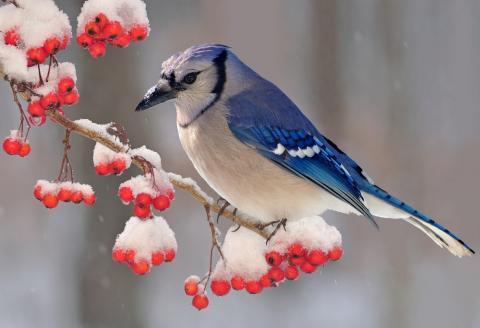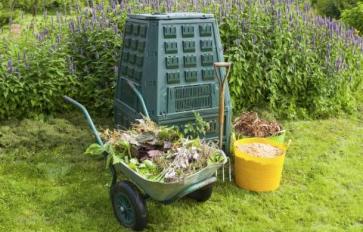
Winter can be a beautiful time to connect with nature and watch birds forage for food. Something that has become particularly popular nowadays is using bird feeders to help give birds access to food through the winter. There are studies still being conducted on the effects that personal feeders have on the bird population, so it has not been fully concluded in research whether they are harmful or not. With that being said, the more sustainable route seems to always be the best way to go. This can be accomplished by growing plants that produce bird-food during the cold season. For those of you who would like to provide birds with food using a more natural method, try growing these 7 plants in your winter garden.
Barberry Bush
There are serval different types of barberry bushes to choose and plant. The berries of barberry bushes contain great nutrients that give birds the energy to get through a cold winter. These shrubs are great for creating a fence-like barrier for your garden, while attracting many birds such as the warbler.
Juniper Shrub
Juniper shrubs smell great, and the berries make fantastic winter-boost for songbirds. Among feeding birds, juniper shrubs are often used as a safe place for feathered-friends to build a nest and take shelter from the harshness that cold winds can bring. Another great thing about the bush is it requires little maintenance.
Callicarpa Japonica
The Callicarpa japonica produces heavy amounts of beautiful purple berries, known sometimes as beauty berries. I have one of these shrubs outside my window and a few more near my place. It’s enjoyable to watch the large groups of robins or wrens fly in and hang around the bushes to feast. Callicarpa japonicas easily grow in areas with partial sun, and can grow to be anywhere from 4 to 6 feet in height and width.
Holly Bush
Even though the berries of a holly bush are not for human consumption, they are perfect for birds! Holly berries from holly shrubs are one of the best kinds of berries for birds to feed on during late winter time. It is essential to know that when growing these types of bushes, both female and male types need to be present for berries to be produced.
Rose Bush
Rose bushes can add a gorgeous touch to your garden in the spring and winter. And did you know the hips can be eaten by birds? Although roses cannot survive a cold winter, the rosehips stay juicy and plump for birds to eat throughout the whole season. Rosehips attract birds such as mistle thrushes, fieldfares, and blackbirds.
Rowan Bush
Rowan bushes, otherwise known as mountain-bushes, have berries that are loved by birds. The berries are edible and even used for culinary purposes, but they are very bitter-tasting. The seeds are simple to germinate, and the bush doesn’t grow very tall. Starlings and blackbirds can be seen feeding on rowan berries.
Ivy
Depending on where you live and your gardening needs, ivy can be either be a nuisance or helpful. The rapid growing plants provide winter berries for birds, and they can attract certain insects as well. Ivy is very simple to grow, and requires little to no maintenance. In addition to producing berries, ivy also makes a nice home for nesting birds. Jays, thrushes, and waxwings love this plant.
You may already have some of these plants growing in your own yard or garden, and that’s wonderful! An important thing to remember when choosing new plants for your garden is to make sure they are native to your specific area because birds eat the berries and spread them around. The plants listed above grow in many different regions, but you don’t have to grow only these types. If you are not able to or uninterested in growing the plants I mentioned, try doing some independent research to find out which plants help feed birds during the winter season in your area. Growing plants that attract birds can make your winter much more pleasant. And as always, please make sure to garden without chemical pesticides, as these are harmful to wildlife.








